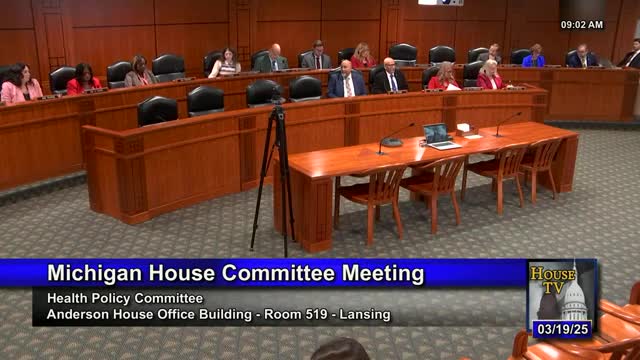Committee hears bill to let patients take home eye drops used during care
Get AI-powered insights, summaries, and transcripts
Subscribe
Summary
Lansing — The House Health Policy Committee on Thursday heard testimony on House Bill 4072, a measure that would permit hospitals, emergency departments and outpatient surgery centers to allow patients to take home topical eye medications (eye drops and ointments) that were opened or started while the patient was under care.
Lansing — The House Health Policy Committee on Thursday heard testimony on House Bill 4072, a measure that would permit hospitals, emergency departments and outpatient surgery centers to allow patients to take home topical eye medications (eye drops and ointments) that were opened or started while the patient was under care.
Proponents said the change would reduce patient costs, cut medical waste and remove delays in obtaining time-sensitive eye medicines. Dr. Scott Westhouse, a retina specialist testifying for the Michigan Society of Eye Physicians and Surgeons, said, “This bill will ensure that topical eye medicines or drops that are used for patient care within the hospital, emergency room, or surgery center can be taken home with a patient if they need it for their continuing care.”
Supporters argued the current practice — discarding partly used bottles at discharge and requiring patients to obtain a fresh supply from a pharmacy — can create both expense and treatment delays. “There is a large disposal of unused eye drops that significantly increases patient cost and also just medical waste to our system,” Westhouse said, and he cited a 2019 study estimating an average of $148 in discarded medications per cataract case and an extrapolated U.S. annual figure of roughly $560 million based on national surgical volumes.
Representatives introducing and supporting the bill framed it as a common‑sense regulatory update modeled on statutes already enacted elsewhere. Representative Steckloff said the proposal was based in part on practice in Illinois, which passed similar legislation in 2021. Witnesses said safeguards — including counseling, labeling and protocols about which medications are eligible — could be required in implementing rules.
Committee members asked about infection risk and the workload placed on providers. Representative Thompson, a registered nurse, noted concerns that the nozzle could contaminate a bottle and asked whether counseling and dispensing would add tasks for clinical staff. Westhouse replied that the bill addresses use of a single bottle for a single patient (not sharing among patients) and that standard patient counseling and labeling practices would remain in place: “We would be following our typical standard of care.”
Committee members also asked whether state dispensing laws currently prohibit the practice. Westhouse said existing pharmaceutical dispensing statutes restrict the volume that can be dispensed outside typical pharmacy prescriptions and that the bill would create an explicit allowance for larger, clinically used bottles (for example, 5–10 milliliter bottles commonly used in eye care).
Several organizations submitted written statements or cards in support, including the Michigan Society of Eye Physicians and Surgeons, Michigan Health Purchasers Coalition and the Michigan State Medical Society. There was no committee vote on the bill at the hearing.
The committee chair said more technical witnesses would follow in future consideration and no vote was taken at Thursday’s hearing.
